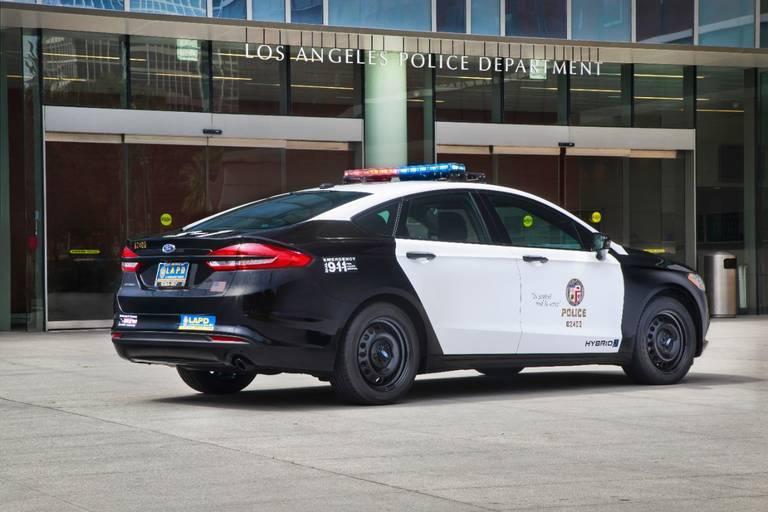
Despite three years of stubbornly low gasoline prices, municipalities still spend much of their budgets on fuel, especially for police cars, which run for extended periods.
Estimates on the cost of fueling a police car are all over the map. But assuming a car such as the Ford Police Interceptor Sedan is driven for two eight-hour shifts, six days a week, every week for a year, that car’s gas bill can approach $8,000 annually with the current cost of gas. Considering how much the typical police car idles, or how much time cash-strapped cities and counties insist those expensive vehicles stay on the road, fuel costs could even trend higher.
But Ford is introducing what the automaker says is the first hybrid police car in the industry. The Police Responder Hybrid Sedan will soon make its debut in New York and Los Angeles. The car’s 2.0-liter, I-4 Atkinson-cycle engine, with its 88-kilowatt electric A/C motor and a 1.4-kW lithium-ion battery, offers what Ford says is an average fuel-efficiency of 38 combined miles per gallon. That's twice as fuel efficient as the popular Interceptor.
By Ford’s estimates, each Responder driven 20,000 miles a year would save municipalities approximately $3,900 in potential fuel costs annually. The company included a calculator on a microsite that allows any city government (or curious citizen) to gauge annual savings based on local gasoline costs, as well as how many miles an average police car is driven annually.
And when it comes to crunching additional numbers, the Responder could catch the attention of municipalities that have to replace their aging police car fleets while trying to meet local sustainability goals.
In Ford’s estimation, the Responder will reduce gasoline consumption by an average of 526 gallons per car, per year. Using the U.S. Energy Information Agency’s data, switching one car to a Responder could result in the displacement of nearly six tons of carbon annually.
The math reveals both the environmental and economic benefits – especially considering Ford sells the most police cars across the U.S., at a rate that approaches nearly two-thirds of the total U.S. market share.
Ford views the Responder as evidence the company is moving forward on fuel efficiency, whether or not the current presidential administration rolls back federal fuel mileage standards (as the U.S. automakers wish).
The Dearborn, Michigan-based automaker pledged to invest $4.5 billion in hybrid and electric car technology over three years to make it not just an automobile manufacturer, but as the buzzword goes, a “mobility company.”
The move toward rolling out more electric vehicles coincides with Ford’s aggressive push to become a major global player within the nascent autonomous car sector -- which resulted in the $1 billion acquisition of an artificial intelligence company earlier this year. The automaker said it is determined to roll out a self-driving vehicle by 2021.
Image credit: Ford Motor Co.

Leon Kaye has written for 3p since 2010 and become executive editor in 2018. His previous work includes writing for the Guardian as well as other online and print publications. In addition, he's worked in sales executive roles within technology and financial research companies, as well as for a public relations firm, for which he consulted with one of the globe’s leading sustainability initiatives. Currently living in Central California, he’s traveled to 70-plus countries and has lived and worked in South Korea, the United Arab Emirates and Uruguay.
Leon’s an alum of Fresno State, the University of Maryland, Baltimore County and the University of Southern California's Marshall Business School. He enjoys traveling abroad as well as exploring California’s Central Coast and the Sierra Nevadas.














